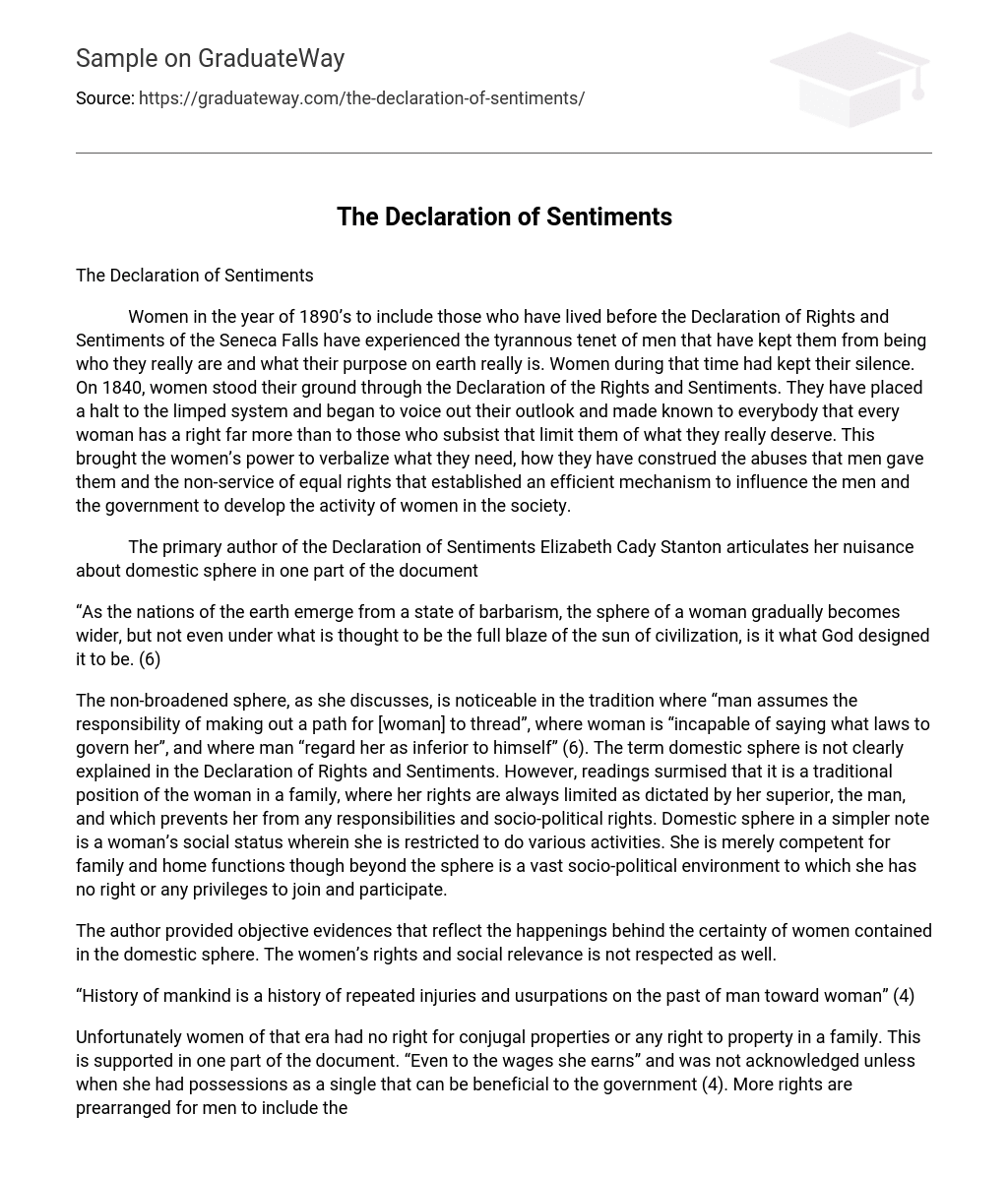Women in the year of 1890’s to include those who have lived before the Declaration of Rights and Sentiments of the Seneca Falls have experienced the tyrannous tenet of men that have kept them from being who they really are and what their purpose on earth really is. Women during that time had kept their silence. On 1840, women stood their ground through the Declaration of the Rights and Sentiments. They have placed a halt to the limped system and began to voice out their outlook and made known to everybody that every woman has a right far more than to those who subsist that limit them of what they really deserve. This brought the women’s power to verbalize what they need, how they have construed the abuses that men gave them and the non-service of equal rights that established an efficient mechanism to influence the men and the government to develop the activity of women in the society.
The primary author of the Declaration of Sentiments Elizabeth Cady Stanton articulates her nuisance about domestic sphere in one part of the document
“As the nations of the earth emerge from a state of barbarism, the sphere of a woman gradually becomes wider, but not even under what is thought to be the full blaze of the sun of civilization, is it what God designed it to be. (6)
The non-broadened sphere, as she discusses, is noticeable in the tradition where “man assumes the responsibility of making out a path for [woman] to thread”, where woman is “incapable of saying what laws to govern her”, and where man “regard her as inferior to himself” (6). The term domestic sphere is not clearly explained in the Declaration of Rights and Sentiments. However, readings surmised that it is a traditional position of the woman in a family, where her rights are always limited as dictated by her superior, the man, and which prevents her from any responsibilities and socio-political rights. Domestic sphere in a simpler note is a woman’s social status wherein she is restricted to do various activities. She is merely competent for family and home functions though beyond the sphere is a vast socio-political environment to which she has no right or any privileges to join and participate.
The author provided objective evidences that reflect the happenings behind the certainty of women contained in the domestic sphere. The women’s rights and social relevance is not respected as well.
“History of mankind is a history of repeated injuries and usurpations on the past of man toward woman” (4)
Unfortunately women of that era had no right for conjugal properties or any right to property in a family. This is supported in one part of the document. “Even to the wages she earns” and was not acknowledged unless when she had possessions as a single that can be beneficial to the government (4). More rights are prearranged for men to include the power over granting her chastisement and liberty, manipulate their divorce’s terms and dictate or order her actions (5). Women are also not allowed to attend church and school to have her education that is why colleges during that time accept no women.
Instances of disrespect, maltreatments and dishonor to the women’s worth are apparent and endured by many. These experiences had brought so much suffering to women, which do not have the voice to speak and heart to breadth out their grievances and sorrows. When women started establishing their feet on the ground, the Declaration of Sentiments aired out what is appropriate for both men and women who ought to have equal rights.
The women before the Declaration of Rights and Sentiments have long undergone sufferings because of their limitation in the domestic sphere. They were denied of their rights, privileges and benefits to include being treated very lowly. Devoid of a voice to complain and speak out, no grievances were noticed.
Nevertheless, the birth and courage of woman like Elizabeth Stanton and the authors of the Seneca Falls Declaration of Rights and Sentiments, women realized that it was time to let all those opinions and sentiments be presented or expressed out to the public. This made men and government to realize, through speech, deed, and writing, that now they will not endure and strive for another day of those sufferings. They reflected that they want their God-given rights provided, respected and served accordingly. Their voices were heard and their presence was known to the public. They have offered their case and provided evidences as to their assertions. They were very lucid with their message and they wedged with their words: we feel neglected and we want transformation!
As a consequence, it is with these initiative and bravery that women were brought, at last, at equivalent position as what men enjoy in the society. It is with their articulation and expression of their gratitude for the unseemly experiences by women in an era with “male preeminence” thinking that they have expanded their audience of men to include the government and have them take action against injustice. It was an apparent demonstration of how far it will go if women were cultured to stand up and speak up for their betterment. It is evident that women’s will to fight abuses towards them by men and non-service of equal rights was a successful approach to influence the government and men to augment the adequate doings of women ahead of the domestic sphere.
Works Cited
Women’s Rights Convention, “Seneca Falls: The Declaration of Sentiments”, New York, Modern History Sourcebook (1848)





